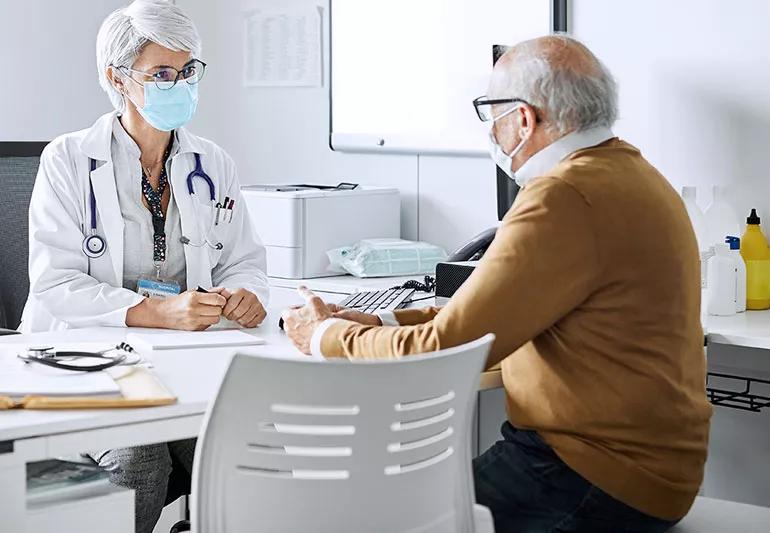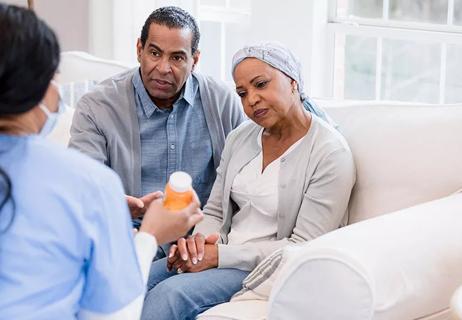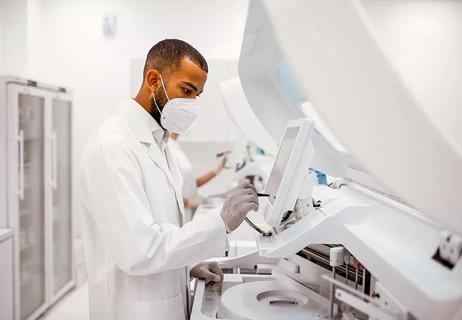There are many options, including surgery or medication

Cholangiocarcinoma, or bile duct cancer, is a rare kind of cancer. According to the Cholangiocarcinoma Foundation, roughly 8,000 people annually in the U.S. develop this.
Advertisement
Cleveland Clinic is a non-profit academic medical center. Advertising on our site helps support our mission. We do not endorse non-Cleveland Clinic products or services. Policy
At first, cholangiocarcinoma doesn’t necessarily have many outward warning signs. “Before you’re diagnosed with cholangiocarcinoma, you may be asymptomatic,” says gastrointestinal oncology specialist Bassam Estfan, MD. “Or if you do have symptoms, they may be very nonspecific. Maybe you’ll have a little bit of fatigue, or decreased appetite, some weight loss. They wouldn’t necessarily raise a red flag.”
After a cholangiocarcinoma diagnosis, you might develop symptoms due to the cancer itself. At other times, complications are caused by your cancer treatment.
Your symptoms can also be affected by where the cholangiocarcinoma is located in your body, or where along the bile duct it develops. For example, if you have gallbladder cancer, or a mass in your liver, you might have pain in the right upper part of your body.
“If the cancer is pretty close to where your gallbladder empties into the bile ducts, that may cause some sort of an obstruction,” Dr. Estfan adds. “The gallbladder may be filled with bile.”
Cholangiocarcinoma has a wide variety of symptoms and complications. These can affect your mental health — for example, causing insomnia, anxiety or depression.
“These are common when someone is diagnosed with cancer,” Dr. Estfan says. “This could be part of the illness itself. Or it could be because of anticipation. Sometimes, you’re trying to anticipate what your future might be like, or the outcomes of the disease. Sometimes, it could be as a result of you anticipating your next scan.”
Advertisement
Cholangiocarcinoma symptoms can also have an impact on your physical well-being.
One major sign of cholangiocarcinoma is jaundice. This condition occurs when a substance called bilirubin, which passes through your liver and is associated with your body processing waste, builds up in your system.
Your bilirubin levels often rise because you have a bile duct obstruction, another common occurrence with cholangiocarcinoma. In fact, an obstruction can sometimes be the first sign of the cancer, although Dr. Estfan says a blockage can happen at any point in the disease’s progression.
Both jaundice and a bile duct obstruction share several common symptoms or signs:
The itchy skin you sometimes experience with cholangiocarcinoma is different than you might expect. “With cholangiocarcinoma, itching isn’t from eczema or inflammation,” Dr. Estfan says. “It’s from a bile obstruction.”
Cholangiocarcinoma can cause fluid to build up in your abdomen, making you look and feel bloated. “That could be another symptom that may indicate your cancer is a little bit more advanced,” says Dr. Estfan. “That means that there is spread of the cancer inside the abdomen cavity. We call this carcinomatosis or peritoneal metastases.”
Bloating or swelling can also happen if you have a large mass or tumor. “You might also actually feel something hard in the upper part of your abdomen,” he adds. “That’s sometimes possible to notice.”
Abdominal pain is also a common symptom, especially if you have a mass or cancer “that is closer to the liver surface or maybe irritates the liver capsule,” says Dr. Estfan. “A large mass in the liver can also cause abdominal pain or a feeling of heaviness.” You can also experience bone pain if the cancer has spread to your bones.
Some symptoms of cholangiocarcinoma are related to the cancer, either directly or indirectly. And some of these are related to cholangiocarcinoma treatment. Common ones include:
Advertisement
It’s not uncommon to experience taste changes. For example, food that you once found delicious tastes rancid or you might have a metallic taste in your mouth. Taste changes can be difficult to manage, says Dr. Estfan, as they can be related to cancer or treatment.
Doctors have a lot of options to prevent and treat symptoms. “We do our best to prevent nausea and vomiting from happening,” states Dr. Estfan. “But there are certain things that you will have to treat as they come along — maybe diarrhea or a change in bowel habits.”
Treating symptoms isn’t always easy, especially because some of them — for example, fatigue, change in bowel habits, insomnia or even weight loss — can be related to treatment or can be related to cancer itself.
If your cancer itself is causing cholangiocarcinoma symptoms, these complications can be fixed with surgery if the outcome would be curative. “Maybe a surgeon can cut out some cancer that has grown,” explains Dr. Estfan. And perhaps your symptoms would improve after that, because now the trigger for them, which is the cancer, is not there anymore.”
But if surgery isn’t possible because the cancer is advanced or a tumor is in a difficult location, all is not lost. “We employ the help of palliative care providers, who work with us to help you manage these symptoms,” says Dr. Estfan. “We work as a team to help address these symptoms.”
Advertisement
Other treatments might include:
If someone has jaundice due to elevated bilirubin levels caused by a blockage, surgery might not be the best option.
Instead, you might opt for a special endoscopy called endoscopic retrograde cholangiopancreatography (ERCP). “Let’s say there is a narrowing along one of your bile ducts, either the main bile duct or one of the branches,” Dr. Estfan explains. “We can put in a stent, which is like a tube that expands. This opens up the blockage and makes the bile flow freely, which alleviates your jaundice symptoms.”
If this procedure isn’t possible, doctors can also implant a device outside your abdomen to drain bile from swollen bile ducts. A similar procedure can be done using catheters if you have built-up fluid in your abdomen.
“We put one tip in the abdominal cavity, where the fluid is, and the other end of the catheter is outside of your body,” Dr. Estfan says. “These catheters can be connected to suction bottles, and it can drain that fluid out.”
In rare cases, a highly specialized endoscopic procedure might be most appropriate to alleviate symptoms of an obstruction. In one surgery, doctors create a bypass (or a detour) between your bile duct and bowels, while another involves draining your gallbladder.
Advertisement
“This isn’t very common, though,” Dr. Estfan notes. “Most of the time, we manage symptoms with minor procedures, either endoscopic intervention or with interventional radiology.”
A bile duct obstruction causes your bilirubin levels to go up. “That buildup in the bilirubin level is what causes the issues,” says Dr. Estfan. “If you do one of those procedures where you can put in a stent — or maybe divert the bile somewhere else, so it doesn’t get trapped in the liver and then back into the bloodstream — then the bilirubin levels will go down.” This can also help alleviate itching, which is caused by the obstruction.
Medication can be helpful to treat anxiety, pain or sleeping troubles. Chemotherapy side effects can also be managed with medication. These include nausea, vomiting, fatigue, lack of appetite, diarrhea or constipation.
“Some of these medications don’t have to be prescription medication,” Dr. Estfan continues. “There’s a lot of over-the-counter medications that can help with some of these symptoms, although some require prescriptions.”
While removing a bile duct obstruction is the best treatment to relieve itchy skin, sometimes, medications like antihistamines could also help relieve discomfort.
“Topical medications, maybe some lotions, could help soothe the skin,” he adds. “Maybe steroids could also help.”
Although fatigue is a common side effect of cholangiocarcinoma, Dr. Estfan says doctors usually advise people to try and stay active. “Maybe even if you do short-term exercises, this can help with stamina and maintaining energy during treatment. Staying active can also prevent fatigue from becoming worse.”
Taste changes aren’t easily managed, as they’re associated with the same medications that cause hearing loss or neuropathy. However, some symptoms will go away if you stop taking a medication or drug that’s causing side effects.
“Sometimes, the management of symptoms could involve taking a little bit break from chemotherapy,” says Dr. Estfan. “Or it could be changing to a different medication. We do have a good repertoire of medications that we can use for these symptoms.”
In some cases, a medication change is crucial so you don’t exacerbate an existing symptom. “If you already live with hearing loss, you probably shouldn’t be on a medication that will cause potentially more hearing loss,” says Dr. Estfan. “But if it happens, you can recognize some of the symptoms and ask about the changing medication as early as you can. That way we can stop the offending drug before it causes any more problems.”
Most cholangiocarcinoma symptoms or complications can be addressed. “However, there are some side effects that we don’t have a whole lot of great remedies for,” says Dr. Estfan. “Hair loss is usually going to happen, and it’s difficult to prevent it.”
Luckily, hair loss or discolored nail beds can be reversed once what’s causing them is taken care of. “However, certain symptoms or complications may end up being permanent, such as hearing loss, or the numbness and tingling from neuropathy,” he continues. “Neurological symptoms either take a longer time to resolve, or you might still experience some degree of the side effect on an ongoing basis.”
At the end of the day, Dr. Estfan stresses that there are certain cholangiocarcinoma symptoms that are going to be less likely to happen than others. And you might even experience some unexpected symptoms.
“Maybe you have an unusual side effect of treatment, or cancer growing in an unusual location that could be causing some other symptoms,” he notes. “Or something else could be wrong. For example, shortness of breath can be an indirect sign of a blood clot.”
The key thing in dealing with symptoms is working as a team with your doctors — and being open about how you’re feeling and what you’re experiencing. “Communication is very important,” encourages Dr. Estfan. “Just because there are 10 to 15 known symptoms of cholangiocarcinoma, something else could happen. Being proactive and letting your care team or providers know of your symptoms, even if they turn out to be nothing, is important.”
Learn more about our editorial process.
Advertisement

You may experience fatigue, weight loss, nausea and diarrhea, but exercise and medication can help

Biomarker testing tells doctors how to target their treatments

Rely on trusted information from hospital systems, medical nonprofits or your oncologist

A decreased appetite can cause weight loss, so opt for smaller meals and full-fat foods

Thoughts and feelings can change over time; relaxation, self-care and support groups can help

You may notice a decrease in your LDL ‘bad’ cholesterol in about four weeks

Options for your changing mobility range from small swaps to major renovations

Chilblain-like skin lesions and rashes are mild (and rare) complications of many viral infections, not just COVID-19

Wearing a scarf, adjusting your outdoor activities and following your asthma treatment plan can help limit breathing problems

Your diet in the weeks, days and hours ahead of your race can power you to the finish line

When someone guilt trips you, they’re using emotionally manipulative behavior to try to get you to act a certain way